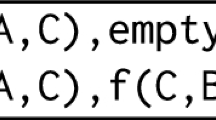Abstract
This paper starts from the following task: Logic programming is to be connected with a declarative concept of database changes. The theory of inductive inference is considered as the domain of application. Learning processes are characterized by hypothetical knowledge and by permanent changes of this knowledge. Finally, the target consists in the creation of GoslerP, a tool of logic programming, which is usable for the modelling of knowledge based learning processes and the implementation of learning algorithms. GoslerP is an extension of Prolog. At the end of the paper, the new possibilities for learning are demonstrated by a first simple application.
The work has been supported by the German Ministry for Research and Technology (BMFT) within the joint project GOSLER (no. 413-4001-01 IW 101 D).
Preview
Unable to display preview. Download preview PDF.
Similar content being viewed by others
References
D. ANGLUIN / C.H. SMITH (1983): Inductive inference: Theory and methods. Computing Surveys 15, 237–269.
H.-R. BEICK (1989): Enumerative learning from examples in a fixed algebra. Fifth Conference of Program Designers, Eötvös Lorand University, Proceedings Vol I p. 27–32, Budapest.
M. CARLSON / J. WIEN (1992): SICStus — Prolog User's Manual. (Version 0.7) Swedish Institute of Computer Science, Kista.
W. CHEN (1987): A theory of modules based on second order logic. Proc. IEEE Int. Symp. Logic Programming, 24–33.
W.F. CLOCKSIN / C.S. MELLISH (1981): Programming in PROLOG. Springer-Verlag.
U. GESKE (1988): Programmieren mit Prolog. Akademie-Verlag Berlin.
E.M. GOLD (1967): Languages indentification in the limit. Information and Control 10, 447–474.
H.-J. GOLTZ / H. HERRE (1990): Grundlagen der Logischen Programmierung. Akademie-Verlag Berlin.
J. GRABOWSKI (1991): Declarative semantics for changing objects: A metaprogramming approach. Informatik-Preprint, FB Informatik, Humboldt-Universität zu Berlin.
J. GRABOWSKI (1992): Metaprograms for change, assumptions, objects, and inheritance. GOSLER Report 09/92, Fachbereich Mathematik und Informatik, TH Leipzig.
J. GRABOWSKI / W. MÜLLER (1990): Introduction to PROPEL (Version 1.0). Informatik-Preprint, FB Informatik, Humboldt-Universität zu Berlin.
P.M. HILL / J.W. LLOYD (1988): Meta-programming for dynamic knowledge bases. CS-88-18, Department of Computer Science, University of Bristol.
P.M. HILL / J.W. LLOYD (1992): The Gödel programming language. CSTR-92-27, Department of Computer Science, University of Bristol.
H. ILINE / H. KANOUI (1987): Extending logic programming to object programming: The system LAP. Proc. IJCAI 87, 34–39, Morgan Kaufmann.
H. ISHIKATO / H. ARIKAWA / T. SHINOHARA (1992): Efficient inductive inference of primitive Prologs from positive data. Algorithmic Learning Theory '92, Springer-Verlag, LNAI 743, 135–146.
K.P. JANTKE / H.-R. BEICK (1981): Combining postulates of naturalness in inductive inference. Journal of Information Processing and Cybernetiks (EIK) 17, 465–484.
T. KOSCHMANN / M.W. EVANS (1988): Bridging the gap between object-oriented and logic programming. IEEE Software, 5(4), 36–42.
F. MELLENDER (1988): An integration of logic and object-oriented programming. SIGPLAN Notices, 23(10), 102–186.
E.Y. SHAPIRO (1981): Inductive inference of theories from facts. Technical Report 192, Computer Science Department, Yale University.
R. WIEHAGEN (1978): Zur Theorie der algorithmischen Erkennung. Diss.B, Sektion Mathematik, Humboldt-Universität zu Berlin.
Author information
Authors and Affiliations
Editor information
Rights and permissions
Copyright information
© 1995 Springer-Verlag Berlin Heidelberg
About this chapter
Cite this chapter
Beick, H.R., Stankov, V. (1995). GoslerP — A logic programming tool for inductive inference. In: Jantke, K.P., Lange, S. (eds) Algorithmic Learning for Knowledge-Based Systems. Lecture Notes in Computer Science, vol 961. Springer, Berlin, Heidelberg. https://doi.org/10.1007/3-540-60217-8_23
Download citation
DOI: https://doi.org/10.1007/3-540-60217-8_23
Published:
Publisher Name: Springer, Berlin, Heidelberg
Print ISBN: 978-3-540-60217-0
Online ISBN: 978-3-540-44737-5
eBook Packages: Springer Book Archive




